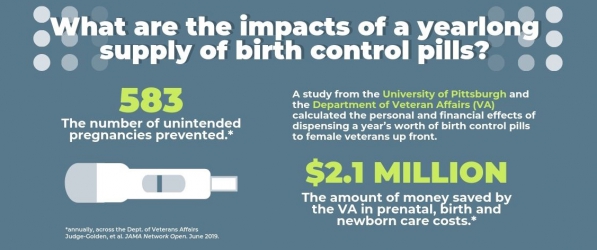
Researchers from the University of Pittsburgh and the U.S. Department of Veterans Affairs have recently published findings from a study that found dispensing birth control to female veterans in larger quantities can reduce both the number of unintended pregnancies as well as associated healthcare costs.
The study, which developed a mathematical model using healthcare data from patients both in and outside the VA health system, suggests that distributing a year’s worth of birth control medication will better support female veterans and busy women everywhere.
“Our motivation is really to improve women's reproductive health, outcome and autonomy," said Dr. Sonya Borrero, a senior author on this study, to Good Morning America.
Data from the VA shows that among patients receiving three-month prescriptions of birth control medications, 43% experience a gap between refills in the course of a year. However, among patients outside the VA, those who are given a year’s worth of pills at the beginning experience less gaps in use and, as a result, less unintended pregnancies.
Dr. Sonya Borrero serves as the director of the Center for Women’s Health Research and Innovation (CWHRI) and as the associate director of the VA’s Center for Health Equity Research and Promotion, which contributed greatly to this study.
“This is a great opportunity for the VA to roll out this policy change on a national level and continue to be a leader and set an elevated standard for women’s health care,” Borrero said.
Lead author Colleen Judge-Golden is a combined MD/PhD student at the University of Pittsburgh School of Medicine. Dr. Borrero is advising her thesis as part of the Medical Scientist Training Program.
Judge-Golden observed that typically, limits on medication dispensing are understood to be cost-saving policies, as they help prevent a backup of wasted or unused medications. However, in this case, the potential consequences of gaps in use or missed refills of birth control medications, which could result in unwanted pregnancies, outweigh concerns about medication wastage.
Additionally, the costs of potential wasted medications are observed to be less than the associated healthcare costs of increased unintended pregnancies. By issuing 12 months’ worth of birth control pills at once, there is a potential to cut female veterans’ healthcare costs significantly.
“We see extended contraceptive dispensing as a win-win,” said Judge-Golden, “promoting women’s health and women’s autonomy to use birth control as they decide, while also being economically sustainable for the VA.”
This study, which has seen significant press attention since its release, has been published in the American Medical Association’s journal JAMA Internal Medicine, and can be found online at the journal’s website.
July 17th, 2019
